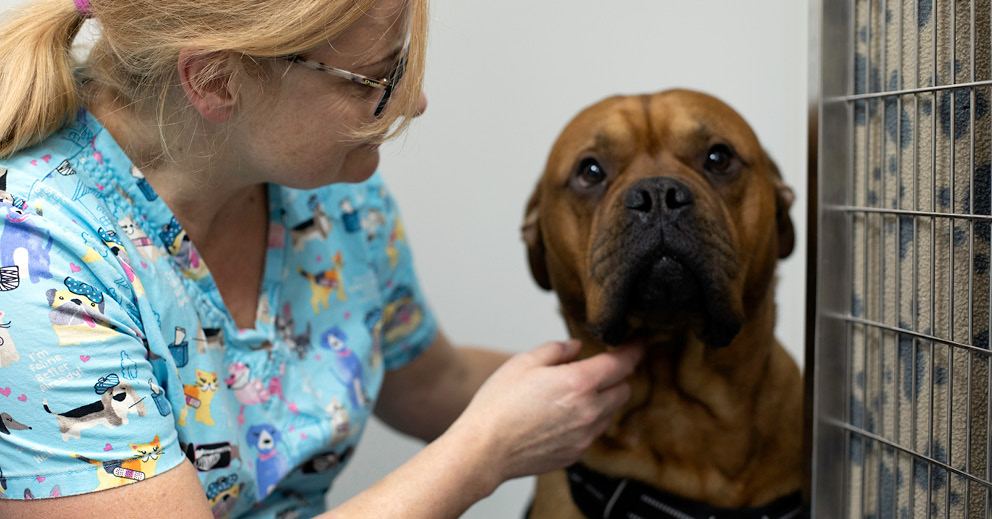
From undertaking formal veterinary care qualifications, to exploring additional training in customer service or veterinary nursing, there are many professional development options available to veterinary care assistants (VCAs). Whether you’re already working as a veterinary care assistant or looking to enter the field in the future, let’s explore how VCAs can progress in their career:
Undertake a formal veterinary care qualification
If you’re a veterinary care professional without a formal veterinary care qualification looking for formal recognition of your skills and experience, there are veterinary care courses available that can help you do so. For example, at The College of Animal Welfare we offer:
- VetSkill Level 2 Certificate in Veterinary Care Support
- City & Guilds Level 2 Diploma for Veterinary Care Assistants
- Veterinary Care Support: Level 2 Apprenticeship
Learn more about monitoring anaesthesia
If you are called upon, or have an interest in, helping with the monitoring of animals under anaesthesia, VCAs have the option to undertake the City & Guilds Level 2 Certificate in Assisting Veterinary Surgeons in the Monitoring of Animal Patients Under Anaesthesia and Sedation qualification. Whilst it is recognised that the monitoring of anaesthesia of companion animals is best carried out by a qualified veterinary surgeon or veterinary nurse, this is not always possible in every circumstance. Therefore, this qualification was developed to equip those, who may be called upon to assist, with the necessary knowledge and skills needed to do so in a safe, professional manner.
Become an Animal Medicine Advisor (SQP)
If you have an interest in veterinary medicines, you could undertake formal training to become an Animal Medicine Advisor (SQP). VCAs can undertake the VetSkill VTEC Level 4 Award for Animal Medicines Advisors (SQP – Companion Animal) qualification in order to achieve this. Successful completion of this qualification allows you to apply for entry onto the VetSkill SQP register and qualifies you to prescribe and supply veterinary medicine classes POM-VPS and/or NFA-VPS to companion animals. As part of your training, you will learn more about the role of an SQP and develop a broad understanding of animal health and disease, as well as the skills to identify parasite infestations and select appropriate medicines to prescribe.
Complete customer service training
Effective customer service combined with specialist knowledge of the record-keeping systems that support clinical services can make the all the difference to the customer experience and ensuing practice reputation. There are opportunities for VCAs who have reception duties to study additional qualifications in veterinary reception, such as the VetSkill Level 2 Certificate for Veterinary Receptionists. Alternatively, you could undertake customer service qualifications in order to learn more about best practices in customer service and boost your client communication skills.
Undertake leadership and management training
VCAs who are aspiring to step into a leadership role in their veterinary care team, or those who enjoy coaching other members of the team and want to learn more about how this is best done, have the option to undertake a leadership and management or coaching and mentoring qualification.
Attend professional development events
Many training providers offer short courses and events open to VCAs looking to progress in their role and network with fellow delegates, for example at The College of Animal Welfare we run an annual VCA Congress. You may also have an interest in attending one of our other veterinary congresses covering subjects such as animal behaviour or animal nutrition.
Train as a Veterinary Nurse
Veterinary Care Assistants have the option to go on to train as a veterinary nurse if they wish to do so. Successful completion of the Level 2 Certificate in Veterinary Care Support or the Level 2 Diploma for Veterinary Care Assistants, in combination with a full level 2 qualification in Maths and English (e.g. GCSE Grade C or above or Level 2 Functional Skills), meet the academic entry requirements to apply for the Level 3 Diploma in Veterinary Nursing, offering an excellent progression opportunity.
There are two routes:
- If you are employed in an RCVS Training Practice (TP) you can start training as a student veterinary nurse at any time (as long as you meet the entry criteria). It should take between two and three years to complete, depending on if you do the diploma as a standalone qualification or as part of an apprenticeship.
- If you are not employed in a TP then you could consider undertaking our three year programme which includes a year long unpaid work placement in a TP in year two which will be sourced for you by our placement team.
You could also consider training as an Equine Veterinary Nurse by undertaking our Level 3 Diploma in Equine Veterinary Nursing.
Explore our veterinary nursing courses
If you have any questions, or you are looking for advice about your next steps as a veterinary care assistant, please don’t hesitate to reach out to a member of our Client Advisor Team. You can reach out by calling us on 01480 422060 or requesting a call back, emailing us at admin@caw.ac.uk or starting a live web chat on our website.
